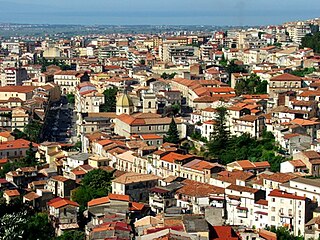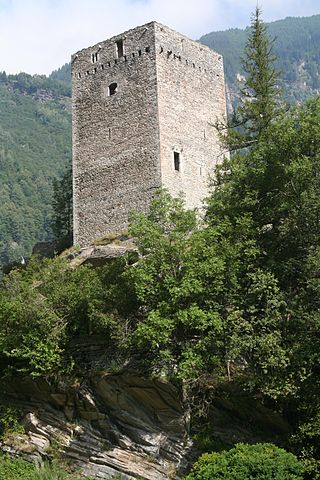
Campobasso is a city and comune in southern Italy, the capital of the region of Molise and of the province of Campobasso. It is located in the high basin of the Biferno river, surrounded by Sannio and Matese mountains.

The province of L'Aquila is the largest, most mountainous and least densely populated province of the Abruzzo region of Italy. It comprises about half the landmass of Abruzzo and occupies the western part of the region. It has borders with the provinces of Teramo to the north, Pescara and Chieti to the east, Isernia to the south and Frosinone, Rome and Rieti to the west. Its capital is the city of L'Aquila.

The Sforza Castle is a medieval fortification located in Milan, northern Italy. It was built in the 15th century by Francesco Sforza, Duke of Milan, on the remnants of a 14th-century fortification. Later renovated and enlarged, in the 16th and 17th centuries it was one of the largest citadels in Europe. Extensively rebuilt by Luca Beltrami in 1891–1905, it now houses several of the city's museums and art collections.

Poggibonsi is a town in the province of Siena, Tuscany, Central Italy. It is located on the River Elsa and is the main centre of the Valdelsa Valley.

Cagli is a town and comune in the province of Pesaro e Urbino, Marche, central Italy. It is c. 30 kilometres south of Urbino. The Burano flows near the town.

Castelbuono is a town and comune in the Metropolitan City of Palermo, Sicily.

Lamezia Terme, commonly called Lamezia, is an Italian city and comune of 70,452 inhabitants (2013), in the province of Catanzaro in the Calabria region.

Santa Flavia is a town in the Metropolitan City of Palermo, Sicily, southern Italy.

Malcesine is a comune (municipality) on the eastern shore of Lake Garda in the Province of Verona in the Italian region Veneto, located about 120 kilometres northwest of Venice and about 40 kilometres northwest of Verona. It is one of I Borghi più belli d'Italia.

Barge is a comune (municipality) in the Province of Cuneo in the Italian region Piedmont, located about 50 kilometres (31 mi) southwest of Turin and about 45 kilometres (28 mi) northwest of Cuneo. The population numbered 7,589 as of 30 November 2019.

Castelmur Castle is a castle in the village of Bondo in the municipality of Bregaglia of the Canton of Graubünden in Switzerland. It is a Swiss heritage site of national significance. The fortifications at Castelmur may be, after the Three Castles of Bellinzona, the most important example of medieval valley fortifications in modern Switzerland.

Santa Maria in Calanca Castle is a tower in the municipality of Santa Maria in Calanca of the Canton of Graubünden in Switzerland. It, along with the neighboring Church of the Assumption of St. Mary, are both Swiss heritage sites of national significance.

Belmont Castle is a ruined castle near Flims, Graubünden, Switzerland. It was the home of the Barons of Belmont.

The Visconti Castle of Bereguardo, Castello Visconteo of Bereguardo in Italian, is a medieval castle in Via Castello 2, Bereguardo, Province of Pavia, Lombardy, Italy.

Mussomeli is a town and comune in the province of Caltanissetta, Sicily, Italy.

The Castle of Barisciano is a medieval castle in Barisciano, province of L'Aquila, Abruzzo, southern Italy.

Castello Caracciolo is a Middle Ages castle in Tocco da Casauria, Province of Pescara (Abruzzo).

The Visconti Castle is a medieval fortification that stands south of Legnano on a natural island in the Olona River. It has also been known as the castle of San Giorgio since the 13th century. The architectural complex is located on Viale Toselli, between Castello Park and Piazza I Maggio.

The Visconti Castle of Monza was a medieval castle in Monza, Lombardy, northern Italy. Its construction was initiated at the behest of Galeazzo I Visconti in the 14th century. In 1527, a revolt by the citizens of Monza demolished its tallest tower, marking the beginning of the castle's destruction. Today, only a small tower on the Lambro River survives, along with the remains of a drawbridge.




















